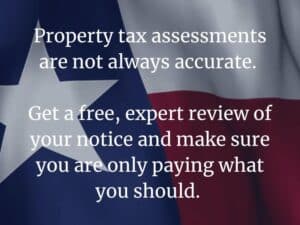If you own commercial property in Texas, property taxes are likely one of your largest annual expenses. What many owners do not realize is that appraisal districts often overvalue commercial properties, and you have the right to challenge those assessments.
The commercial property appeal process is different from residential protests. It usually involves larger valuations, more documentation, and more opportunities for costly mistakes if you are not fully prepared.
In this article, we will walk through how commercial property tax appeals work in Texas, what evidence you need to build a strong case, and how to secure meaningful savings whether you own an office building, a warehouse, a retail space, or a multifamily property.
How Commercial Properties Are Appraised
Commercial properties are valued differently from residential homes because they are viewed primarily as income-producing assets. While residential appraisals focus heavily on comparable sales of similar homes, commercial property valuations often rely on more complex methods that consider the building’s ability to generate revenue, replacement costs, or investment potential.
There are three main methods appraisal districts use to determine the value of a commercial property:
-
Income Approach:
This method estimates the value of the property based on its potential to produce rental income. Appraisers calculate expected revenue, subtract operating expenses, and then apply a market capitalization rate to determine value. If the appraisal district overestimates your rent rates, underestimates your expenses, or uses a cap rate that is too low, your property’s value can be pushed far above what it should be. -
Cost Approach:
When income information is not available or reliable, the district may use the cost approach. This method estimates how much it would cost to rebuild the property today using current construction prices, then subtracts depreciation for age, wear and tear, and functional obsolescence. Land value is then added separately. This approach can create inflated values if the district does not accurately account for real-world deterioration or outdated features. -
Market Approach:
Although less common for commercial properties, the market approach uses recent sales of similar buildings to estimate value. Because commercial properties tend to be unique in size, condition, and use, it is often difficult to find truly comparable sales, which limits the reliability of this method for many commercial owners.
Problems can arise when appraisal districts apply general assumptions that do not reflect the real financial performance or physical condition of your property.
Some of the most common issues include:
-
Using rental rates that are based on industry averages rather than your actual leases
-
Assuming unrealistic vacancy rates that do not reflect current market conditions
-
Applying capitalization rates that are lower than appropriate, which inflates the valuation
-
Overlooking deferred maintenance, environmental issues, or property-specific challenges that reduce your building’s true market value
Because commercial properties are so varied, even small mistakes in how income, costs, or physical conditions are handled can lead to large errors in your appraised value.
Understanding how your property was appraised and identifying any incorrect assumptions is the first step toward preparing a strong and effective protest.
The Commercial Protest Process
The basic protest timeline for commercial properties follows the same structure as residential protests, but the preparation expectations are much higher. Appraisal districts expect commercial owners to bring detailed financial documents and strong evidence to justify any requested reductions.
Here is a general overview of the commercial protest process:
-
Deadline:
You must file your protest by May 15 or within 30 days after the Notice of Appraised Value was issued, whichever date is later. -
Initial Filing:
Submit Form 50-132 or use your county’s online protest portal to register your appeal officially. -
Informal Review:
You will first meet with a CAD appraiser to discuss your evidence and attempt to reach a settlement without a formal hearing. -
Formal Hearing (ARB):
If you do not settle informally, you will present your case before the Appraisal Review Board. This hearing is recorded, and panelists will review all submitted documents. -
Next Steps (if needed):
If you are not satisfied with the ARB’s decision, you can pursue binding arbitration, file a lawsuit in district court, or request a hearing before the State Office of Administrative Hearings (SOAH).
Because commercial appeals often involve high property values and complex valuations, proper organization and preparation are essential. A weak or incomplete protest packet can cost you significant savings.
What Evidence Works Best for Commercial Appeals
Successful commercial protests depend on providing strong, detailed evidence that supports your requested valuation. The appraisal district will not lower your value unless you present a clear and well-documented case.
Some of the most effective documents include:
-
Income and Expense Statements for at least the past two to three years
-
Current and Prior Rent Rolls to show leasing trends and real-world revenue
-
Vacancy Reports that demonstrate actual occupancy levels
-
Cap Rate Studies that align with your property’s market and class
-
Appraisals or Broker Opinions of Value (BOVs) prepared by industry professionals
-
Maintenance or Repair Estimates to account for deferred maintenance or condition issues
If your building has physical challenges such as roof leaks, foundation problems, outdated mechanical systems, or compliance violations, include photographs, inspection reports, and contractor estimates.
A well-organized protest packet with a summary page and clearly labeled sections makes it easier for appraisers and ARB panelists to understand and support your position.
Why Appealing Matters for Commercial Owners
Appealing your commercial property taxes is not just about saving money this year. It is a long-term strategy that protects your property’s cash flow, strengthens its market value, and improves its overall financial performance.
For commercial owners, even small improvements in valuation can create significant benefits over time.
Here are a few important reasons to make appealing your property value part of your annual business plan:
-
Small reductions create meaningful savings.
A modest five percent decrease in your property’s assessed value can lower your annual tax bill by thousands of dollars. These savings add up year after year and directly improve your bottom line. -
Lower taxes increase Net Operating Income (NOI).
Reducing your property tax expense raises your NOI, which strengthens your property’s financial health and enhances its appeal to lenders and future buyers. -
Appeals help with tenant retention.
In triple-net lease structures, property taxes are passed through to tenants. Keeping tax bills lower makes your lease rates more competitive and helps you maintain satisfied, long-term tenants. -
Lower taxes improve overall asset valuation.
Since commercial properties are typically valued based on income, reducing your operating expenses through a successful appeal increases your property’s market value. -
Strong tax management supports investor and lender confidence.
Investors and lenders expect active management of major expenses. Successfully appealing your taxes demonstrates that you are protecting the investment and managing the property with care.
Appealing your commercial property taxes each year is more than just a cost-saving tactic. It is a critical part of maintaining the value, profitability, and long-term success of your real estate investment.
Conclusion
Commercial property tax appeals in Texas are not just an administrative task. They are a smart, proactive strategy to protect your property’s financial performance and maximize your investment returns.
Commercial property owners can save thousands each year with the right documents, strong preparation, and a clear understanding of the protest process.
Whether you own one building or a diversified portfolio, regularly appealing your property valuation should be part of your long-term strategy.
If you need help, our commercial appeal team is here to represent your interests and fight for the fair value your property deserves.






